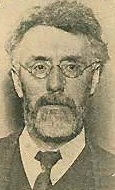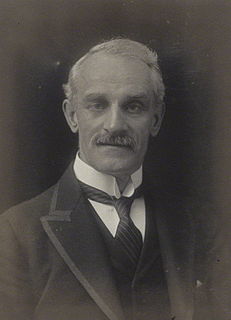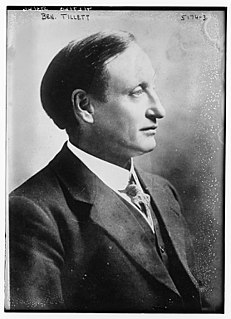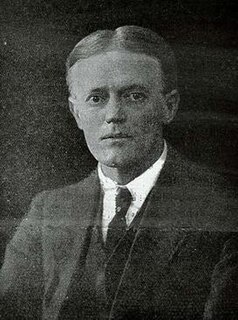Related Research Articles

Robert Williams was a British trade union organiser.

David Daniel "Dan" Irving was a British socialist activist and Labour Party Member of Parliament.

Thomas Raven Ackroyd was an English bank manager and Liberal Party politician.

Sir Joseph Davies was a Welsh businessman, commercial statistician and Liberal Party politician. He was one of a talented group of men and women who worked closely with David Lloyd George during his premiership as a key member of Lloyd George's wartime secretariat, known as the Garden Suburb.

Benjamin Tillett was a British socialist, trade union leader and politician. He was a leader of the "new unionism" of 1889 that focused on organizing unskilled workers. He played a major role in founding the Dockers Union, and played a prominent role as a strike leader in dock strikes in 1911 and 1912. He enthusiastically supported the war effort in the First World War. He was pushed aside by Ernest Bevin during the consolidation that created the Transport and General Workers' Union in 1922, who gave Tillett a subordinate position. Scholars stress his evangelical dedication to the labour cause, while noting his administrative weaknesses. Clegg Fox and Thompson described him as a demagogue and agitator grasping for fleeting popularity.

Albert Arthur "Alf" Purcell was a British trade unionist and Labour Party politician. He was a founding member of the Communist Party of Great Britain and later President of the International Federation of Trade Unions from 1924 to 1928 and sat in the House of Commons during two separate periods between 1923 and 1929.

Robert Dunstan was a British doctor and political activist.
Fleming Eccles was a British socialist politician and trade unionist.

Sir John William Bowen CBE, known as William Bowen, was a British trade unionist and politician.
Thomas Charles Lewis was a British trade unionist and politician.
Isaac Brassington was a British trade unionist and political activist.
Matthew Burrow Farr was a British trade unionist and Labour Party politician.
Thomas William Gillinder (1887–1968) was a British politician and trade unionist.
James Gorman was a British politician and trade unionist.
Joseph George Butler was a British politician and trade unionist, who served on London County Council (LCC).
Benjamin Skene Mackay was a Scottish politician and trade unionist.
Robert Henry Farrah was a British trade unionist and politician.
Walter Fowden was a British politician and swimmer.
Gilbert Arthur Foan was a British hairdresser and socialist politician. He wrote several influential books on hair and make-up.
Arthur Whiting was a British politician.